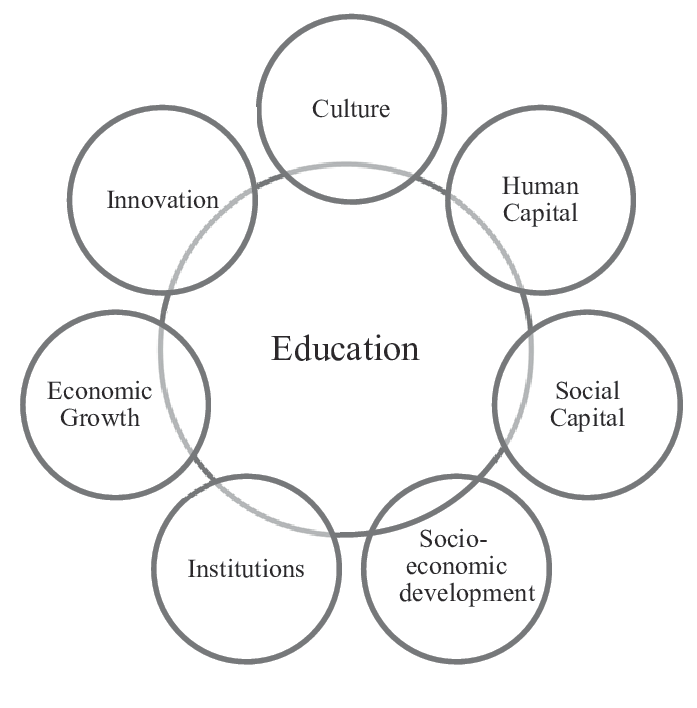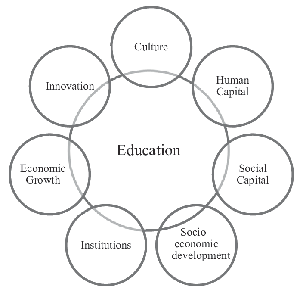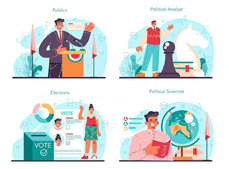Education plays a critical role in shaping the economy, serving as a catalyst for growth, innovation, and prosperity. With each passing year, the connection between education and economic development becomes more apparent. As societies become more knowledge-based, countries that invest in education reap significant benefits.

Photos by researchgate
Relationship between education and economic growth
Quality education equips individuals with the skills and knowledge needed to succeed in the workforce, thereby increasing productivity and driving economic growth. When individuals receive a solid education, they are better prepared to contribute meaningfully to the economy. They possess the necessary skills to take on higher-skilled jobs and are more likely to be productive, resulting in increased output and economic development.
Education empowers individuals to think critically, solve problems, and adapt to changing circumstances. It cultivates an entrepreneurial mindset that fosters innovation and encourages the creation of new businesses, products, and services. By nurturing a culture of innovation, education fuels economic growth by driving technological advancements and improving overall productivity.
Economic benefits of a well-educated workforce
A well-educated workforce brings numerous economic benefits to a country. When individuals receive a high-quality education, they are more likely to secure higher-paying jobs. Higher levels of education are often associated with higher earning potential, as individuals possess the skills and qualifications necessary for more specialized roles. As a result, individuals with higher levels of education have greater purchasing power, leading to increased consumer spending and economic stimulus.
A well-educated workforce is more likely to engage in research and development activities, leading to further advancements in various industries. Education enables individuals to acquire the necessary knowledge to drive innovation, resulting in the creation of new products, services, and technologies. This, in turn, stimulates economic growth and competitiveness on a global scale.
Education and employment opportunities
Education plays a crucial role in determining employment opportunities. Individuals with higher levels of education are more likely to have access to a wider range of job prospects. Employers often prioritize candidates with a strong educational background, as they possess the necessary skills and knowledge to excel in their roles. Investing in education not only benefits individuals but also increases the overall employability and productivity of a nation.
Education equips individuals with transferable skills that can be applied across various industries. In a rapidly changing job market, individuals need to adapt to new technologies and evolving skill requirements. By investing in education and fostering lifelong learning, individuals can stay competitive in the job market and contribute to the economy more effectively.
Role of education in reducing poverty and inequality
Education has the power to reduce poverty and income inequality by providing equal opportunities for upward mobility. Access to quality education enables individuals from disadvantaged backgrounds to break free from the cycle of poverty. By equipping them with the necessary skills and knowledge, education empowers individuals to secure higher-paying jobs, improving their overall living standards.
Education helps bridge the gap between different socioeconomic backgrounds by providing a level playing field for all individuals. By offering equal access to education, societies can ensure that everyone has an equal opportunity to succeed, regardless of their socioeconomic status.
This not only benefits individuals but also contributes to the overall prosperity of a nation, as it reduces inequality and fosters a more inclusive society.
Education as a driver of innovation and productivity
Education is a key driver of innovation and productivity in a knowledge-based economy. By providing individuals with a solid educational foundation, societies can foster a culture of creativity and critical thinking. Education encourages individuals to question the status quo, think outside the box, and come up with innovative solutions to complex problems.
Education equips individuals with the technical skills and knowledge required to engage in research and development activities. This leads to advancements in various fields, such as technology, medicine, and engineering. By investing in education, countries can position themselves at the forefront of innovation, attracting businesses and creating a competitive advantage in the global market.
Education and entrepreneurship
Education plays a crucial role in fostering an entrepreneurial mindset. By providing individuals with the necessary skills and knowledge, education enables them to identify and seize business opportunities. Entrepreneurship drives economic growth by creating new businesses, generating employment opportunities, and introducing innovative products and services to the market.
Education equips individuals with essential business skills, such as financial literacy, marketing strategies, and problem-solving abilities. These skills are crucial for aspiring entrepreneurs to successfully navigate the challenges of starting and running a business. By investing in education, countries can cultivate a culture of entrepreneurship, leading to increased economic activity and prosperity.
Government investments in education and its economic returns
Government investments in education yield significant economic returns. When governments allocate sufficient resources to education, they enable individuals to acquire the necessary skills and knowledge to contribute to the economy effectively. By investing in educational infrastructure, such as schools, universities, and vocational training centers, governments create an environment conducive to learning and skills development.
Government investments in education can lead to a more skilled and productive workforce, attracting foreign direct investment and fostering economic growth. When businesses see that a country has a well-educated workforce, they are more likely to invest in that country, bringing in new jobs and driving economic development.
Challenges in education and its impact on the economy
Despite the numerous benefits of education on the economy, there are several challenges that need to be addressed. Inadequate access to education, particularly in marginalized communities, can hinder economic development and perpetuate inequality. Limited resources, such as funding and infrastructure, can limit the quality of education provided, resulting in a workforce that is ill-equipped to meet the demands of a rapidly evolving economy.
The lack of alignment between educational curricula and the needs of the job market can lead to a skills gap. When the skills taught in schools do not match the skills required by employers, individuals may struggle to find suitable employment opportunities. This can hinder economic growth and reduce the overall productivity of a nation.
Importance of prioritizing education for economic development
Education is not only crucial for individual success but is also a key driver of economic development and overall societal well-being. Quality education equips individuals with the skills and knowledge needed to succeed in the workforce, driving productivity and innovation. It reduces poverty and income inequality by providing equal opportunities for upward mobility. Education fosters entrepreneurship, stimulates consumer spending, and attracts foreign investment.
To ensure sustained economic growth, it is imperative that governments prioritize investments in education. By allocating sufficient resources and addressing the challenges faced by the education system, countries can create a flourishing economy with opportunities for all. Education is the foundation upon which prosperous societies are built, and its impact on the economy cannot be understated.




